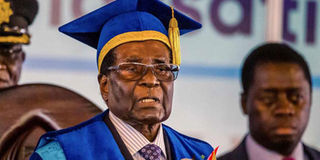Why Mugabe’s ouster is both a tragedy and blessing for Africa

Zimbabwe's President Robert Mugabe delivers a speech during a graduation ceremony at the Zimbabwe Open University in Harare, where he presides as the Chancellor, on November 17, 2017. Mugabe lost contact with reality and over-estimated his capabilities and popularity. PHOTO | AFP
What you need to know:
- Longevity in high office has a habit of making one’s sycophants the real rulers of a country and Zimbabwe is no exception.
- To hold on to power, dictators have to emasculate every institution including Parliament, the Judiciary and the media.
Robert Mugabe’s life and career is a tragedy of Aristotelian proportions.
Here is a man, trapped by delusions of grandeur, who destroyed his enviable reputation as a freedom fighter and revolutionary hero because he simply could not recognise that 20 years ago, he was already way past his sell-by date.
He so believed in his ability to rule Zimbabwe for life that he forgot the adage: He whom the gods would destroy they first make mad.
PRIME MINISTER
This is not to say Dr Mugabe was ever mad; he was just in the tight grip of hubris, making him lose contact with reality and over-estimate his capabilities and popularity.
Towards the end, of course, he was simply senile, which made it easy for those surrounding him to manipulate him and make many of his utterances and actions completely illogical.
In that alone lies the tragedy.
I first studied Mugabe’s life history when I reviewed one of his biographies back in the early 1980s, shortly after he became Zimbabwe’s first Prime Minister.
POPULARITY
He was my hero then, having fought the Ian Smith minority white regime and prevailed, and like many Africans, I believed in him.
The biography was not necessarily unfair to Mugabe but it did depict him as a dour, humourless individual who hated the white race in general and Britons in particular, no doubt because of what he had undergone in Zimbabwe’s jails.
How he was to lose this appeal is a long story, but it was his unwillingness to let go that dealt him the final blow.
Longevity in high office has a habit of making one’s sycophants the real rulers of a country and Zimbabwe is no exception.
President Mugabe should have recognised that he would not have lasted that long in power were it not for the support given by the men and women who went with him into the bush to fight the white minority regime.
MNANGAGWA
Most likely, were it not for that backing, Mugabe would have been forced out of office or lost elections long ago.
But when he started his usual heavy-handed purges against potential adversaries, including those in the military, he stepped on the wrong toes.
His sacking of Vice-President Emmerson Mnangagwa was ill-advised and the military leaders felt extremely vulnerable with his sustained grooming of his unpopular wife to succeed him.
For all practical purposes, the Zimbabwe Defence Force staged a coup this week.
MILITARY
They have been careful to sanitise the nature of the takeover, merely claiming they were doing so to remove criminals from among Mugabe’s cronies.
The intervention was bloodless -- a rarity in Africa -- but it was a coup all the same.
The reason for the ZDF’s coyness is clear: The international community can’t countenance military takeovers any longer, and the soldiers dare not antagonise anyone yet, for the country’s economy is in ruins.
The other fact is that the military brass always was among the ruling elite, and their intervention was meant to protect their property.
They are among those who benefited most when Mugabe expropriated white-owned farms and dished them out.
LIBERATION
They cannot claim, therefore, to have acted on behalf of their poor countryfolk; they were simply looking after their own interests.
In that sense, nothing much is likely to change except that now the military will have a bigger, more overt, say in the running of the country.
In short, Zimbabweans will have to wait a little longer for a second liberation.
There are a few important lessons to be gleaned from this epic event.
DICTATORS
One of them is that many African States are extremely fragile, which is mostly because dictators and tyrants have no time for the independence of their institutions or supremacy of their constitutions.
To hold on to power, dictators have to emasculate every institution including Parliament, the Judiciary and the media, and they have to neutralise even their most loyal supporters deemed to be potential threats, which means that when the end comes, they are virtually alone.
The second lesson is for us Kenyans.
There are forces that appear determined to destroy this country and their mantra seems to be that in their pursuit of power, the end justifies the means.
They should be warned, for if they persist in such daredevil tactics, there is a likelihood of this country plunging into an abyss, an outcome that must be avoided at all costs.




